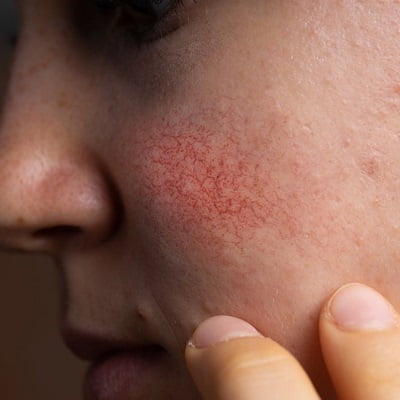
Can Botox Be Used to Treat Rosacea?
Rosacea in Islamabad is a skin disease that causes the facial skin to become red and may include bumps and pustules, the visibility of blood vessels. This condition can be worrisome, mainly because it tends to worsen because of such things as exposure to the sun, stress, alcohol, or certain types of foods. The earlier ways of treating rosacea included the use of topical ointments, oral medicines, and laser treatment. However, an alternative less conventional method for treating rosacea is being discussed – Botox. And Can Botox be used to treat rosacea? Read the blog to know the answer.
Understanding Rosacea and Its Challenges:
Before we embark on the discovery of using Botox in treating the condition, one has to appreciate the nature of rosacea. Rosacea is a skin disease that affects blood vessels and causes inflammation; the disease has no cure and the symptoms are treated. The primary forms of rosacea include
Erythematotelangiectatic Rosacea: Unlike the Rosacea, which manifests itself by facial redness and blood vessels that can be discerned on the skin.
Papulopustular Rosacea: It manifests as redness with a pimple-like formation.
Phymatous Rosacea: Inflames the skin, contributing to skin thickening mainly in the vicinity of the nose.
Ocular Rosacea: Resulting in eye inflammation and consequently redness of the eyes.
They are also each managed differently, meaning that this method and that type simplify the management process, Metronidazole, and azelaic acid are commonly used topical treatments for rosacea.
What is Botox?
When injected with Botox or botulinum toxin type A, the facial folds are frozen, resulting in the removal of wrinkles. Apart from beautification, this product has been proven in the management of medical conditions like migraines, hyperhidrosis, and muscle spasticity.
How Botox Could Help in Treating Rosacea:
Botox is effective in the reduction of muscle contraction since it paralyzes muscles and thus interferes with nerve impulses. Still, Botox is a somewhat different way of treating rosacea than for other conditions. Here’s how it helps:
Reduction of Facial Flushing:
- The enzyme that controls the blood vessel dilation is believed to be inhibited by Botox; thus limiting facial redness and blushing; key offending signs in rosacea.
- It achieves this through restricting the amounts of acetylcholine which is always a neurotransmitter that leads to the expansion of blood vessels.
Decrease in Sebum Production:
- Botox works effectively in lowering the secretion of sebum on the skin.
- Sebum can also be troublesome because it can cause a breakout of rosacea, especially for those who suffer from oily skin.
Anti-Inflammatory Effects:
The anti-inflammatory properties of Botox mitigate inflammation effects and help reduce rosacea symptoms.
The Procedure: What to Expect
- However, If you’re considering Botox for rosacea, make sure to consult a certified dermatologist or healthcare provider.
- It involves the administration of small amounts of Botox beneath the dermis of the regions affected by the condition.
- When treating wrinkles, Botox is administered subdermally while for rosacea, Botox is injected intradermally
- This technique is used to treat the outer layer of the skin.
- The mini blood vessels, contributing to the redness, are the targeted spots.
There may be some discomfort, more swelling, and some bruising at the site of injection and all these are usually temporary and will only last for a few days at most.
Are There Any Risks?
Like any medical procedure, using Botox for rosacea carries potential risks. These can include:
- Temporary Bruising or Swelling
- Asymmetry or Muscle Weakness
- Temporary Skin Tightness or Dryness
Still, it is essential to seek advice from a professional before proceeding with such a move and to know what this implies and the amount of risk that comes with such a move.
Is Botox a Viable Option for Rosacea?
Self-care for some might be new if they have not benefited from conventional remedies hence is Botox the answer? The majority of rosacea cases require more extensive studies to determine the effectiveness and risks associated with its application for rosacea.
Thus, to find the answer to this question, it is crucial to turn to a knowledgeable professional for a consultation.
Final thoughts:
At SKN Cosmetics, clients will find our professionals up-to-date with the most modern trends in treatments and technologies. We help our clients come up with solutions for dealing with rosacea by providing consultation services. If you are interested in new solutions for rosacea and other skin problems, including Botox. Contact us to start your journey toward achieving perfect skin.

